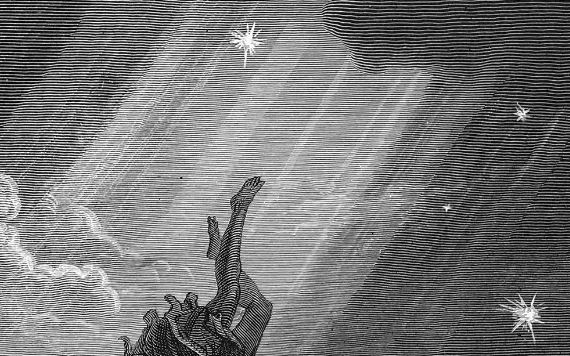Last Revision: August 24, 2022

Illustration for John Milton’s Paradise Lost by Gustave Doré (1866)
Introduction
This post describes the sonnet by George Meredith titled, “Lucifer in Starlight”.
I’ll attempt to decipher the poem and describe its basic structure.
Lucifer in Starlight by George Meredith
Hopefully you’ve had that experience of seeing or reading something that just resonates deep down inside you.
You might not be able to exactly articulate why, but it does .
The meaning of the words or perhaps just the sound of the words in their particular order evoke an emotion, physical reaction etc.
The poem “Lucifer in Starlight” does that for me.
You should read the poem now. Read it a few times.
Note: The blue fonted annotations at the end of each line are my notes showing line number, rhyme scheme designation and number of syllables.
The Poem’s Affect on Me
Interpreting this poem accurately (assuming there is just one interpretation) is a little challenging but we’ll get to that in the next section.
Put aside the meaning or interpretation and just read the words and how they fit and sound together. As you read this the first few times, what kind of physical or mental reactions does it evoke from you?
To me, this poem is a beautiful and melodic way to describe Good triumphing over Evil.
The sweeping action and swift conclusion, described in so few words, is mesmerizing.
The symmetry and structure of the poem make it decisive and conclusive.
Lucifer in Starlight – Meaning
In this section I’ll describe the meaning of the lines of the poem as best I can. In the following section I’ll describe the poem structure.
The following are my line by line interpretations of the poem:
- Evil as symbolized by the Bible’s Lucifer (the Devil) comes out of Hell. (I imagine with great force and energy)
- Sick of Hell’s darkness, it flies out. (“swung the fiend” evokes a huge winged creature taking off and flying away…Like the big dragon in Game of Thrones!!)
- Lucifer is now flying above Earth , obscured by clouds,
- where sinners fearing death, (I’m interpreting “sinners hugged their specter of repose” as “people fearing death”. Maybe it just means “unwitting people who are asleep”. I’d love to know what Meredith specifically was thinking with this phrase)
- are not enough to satisfy Lucifer’s rage.
- The huge winged monster now veers West. (The West has connoted evil and darkness in Christianity. How cool is “and now upon his western wing he leaned”)
- Now the massive thing flies violently over the Saharan Sands,
- and now the creature shadows Arctic Snows. (This thing is immense and menacing!)
- Then higher it goes towards Heaven. This causes Lucifer to remember
- his banishment from Heaven. (Described in the bible but detailed greatly in John Milton’s epic poem Paradise Lost)
- Upon reaching some middle height, in the stars, between Hell and Heaven,
- Lucifer retreats and descends back to Hell; Defeated.
- The stars, like the legions of
- an army, defend Good against Evil.
The Poem’s Structure
You can refer to the following link for more information on sonnets: Yale on Sonnets Link
The poem is in sonnet form (mostly) which was famously used by Shakespeare (1564 – 1616) and other poets like John Milton (1608 – 1674).
Some articles suggest that Meredith must have been influenced greatly by John Milton’s Paradise Lost (a 10,000 line epic poem describing Lucifer’s conflict with God/Heaven and his temptation of mankind).
A little about the sonnet style:
- The sonnet has 14 lines.
- It has a strict rhyme scheme and
- is normally written in Iambic Pentameter. (10 syllables per line with each unstressed syllable followed by a stressed syllable. Think “da Dum , da Dum” sequences like a heartbeat)
I learned (probably for the second time…Didn’t they make us learn these things in English class in High School?) that an “iamb” describes the stressed/unstressed syllabic sequence.
Pentameter means five meters or sets of iambs (basically 10 syllables per line).
Milton used Iambic Pentameter structure in his “Paradise Lost” but didn’t rhyme anything (Blank Verse).
The 14 lines of Meredith’s sonnet (similar to a Petrarchan sonnet) are divided into an
- octave: (8 lines with rhyming sequence ABBA ABBA) and a
- sestet: (6 lines with rhyming sequence CDCEED).
The sestet portion starts in line 9.
Lines 10 and 12 violate the sonnet rules by having 11 syllables.
The rhyming scheme in the sestet is different as well. The overall effect of this sestet structure causes the frenetic pace of the poem to lessen. The tide has turned and the great menace has been turned a way by a stronger force!
Conclusion – Lucifer in Starlight
Read the poem Lucifer in Starlight by George Meredith and revel in its simple, forceful, evocative, lyrical and structured style!

